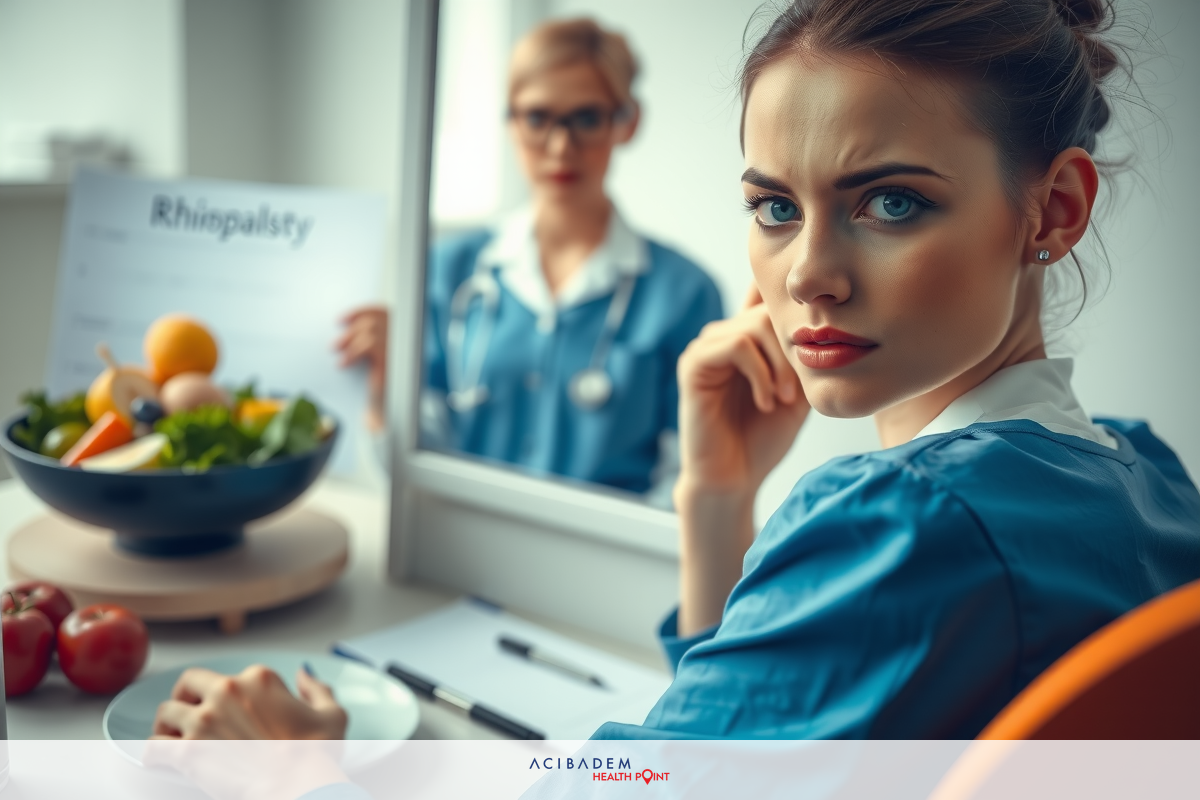Can I Eat Before Rhinoplasty?
Can I Eat Before Rhinoplasty? Rhinoplasty, the reshaping of one’s nose, presents numerous considerations. The most common concern for many is whether they can eat before this surgery. Meal ingestion prior to such an operation has implications that extend beyond mere hunger pangs.
Navigating these dietary restrictions and guidelines can sometimes feel like a labyrinthine task. The importance of adhering strictly to preoperative diet instructions cannot be overstated; it guarantees not only the success but also the safety of the rhinoplasty process. With careful attention to meal planning and timing, potential complications related to anesthesia can be avoided while ensuring optimal surgical outcomes.
The curiosity surrounding what foods are permissible or forbidden before surgery is justifiable. This piece aims to untangle these complexities by providing clear guidance on preoperative diets for those preparing for a rhinoplast significantly altering their lives through this transformative journey.
Preoperative Diet Guidelines
When scheduling a rhinoplasty, the thought of food might seem insignificant. However, understanding and adhering to preoperative diet guidelines is crucial for ensuring a safe and successful procedure. It’s not just about what one can eat before rhinoplasty; it’s also about when and how much. Fasting or refraining from eating for a certain period before surgery is typically recommended by surgeons.
A common guideline is to avoid solid foods after midnight on the day of your operation. This precaution minimizes the risk of aspiration during anesthesia administrationa life-threatening complication where stomach contents are inhaled into the lungs. The fasting period allows your digestive system sufficient time to process most remnants in your stomach, further reducing this risk.
However, complete deprivation isn’t always necessary nor beneficialcertain liquids may be permissible up until two hours prior to surgery under some circumstances. Clear broths or juices without pulp (like apple juice), black coffee without creamer or milk, and water are usually acceptable according to many surgical standards like those set by The American Society of Anesthesiologists (ASA). These provisions aim at maintaining hydration levels while still keeping an essentially “empty” stomach.
The complexity increases when we consider specific dietary restrictions related to medication intake as part of pre-surgery preparations for rhinoplasty precautions
which often necessitate adjustments in meal guidelines days preceding the operation date. Certain medications may require consumption with food; others must be taken on an empty stomachyour doctor will provide precise instructions based on individual needs.
In conclusion, adherence strictly comes down to timing meals correctly around these considerations while maintaining essential nutrition levels leading up-to surgery dayan intricate balancing act indeed!
Food Restrictions
Beyond the broader guidelines of when to eat, another pivotal aspect of preparing for rhinoplasty revolves around what precisely one should or shouldn’t consume. The concept of food restrictions is not merely limited to fasting prior to surgery but also encompasses avoiding certain foods and beverages in days leading up to the procedure – an integral part of rhinoplasty precautions.
One universal restriction includes alcohol. Alcohol can thin your blood, increasing bleeding risks during surgery. Therefore, it’s vital that patients abstain from consuming alcoholic drinks at least 48 hours prior to undergoing a

rhinoplasty procedure. Meanwhile, caffeine consumption should be significantly reduced if not entirely eliminated as well; excessive caffeine could potentially affect heart rate and blood pressure levels while under anesthesia.
In addition to these prohibitions on specific types of substances like alcohol and caffeine, there are more nuanced dietary factors requiring attention too! Certain foods have been found to interfere with medications or exacerbate swelling post surgeryboth scenarios you’d want fervently to avoid for surgical safety. Foods high in sodium can cause increased fluid retention leading to unnecessary inflammation after surgery so try incorporating lower-sodium alternatives into meals before operation day.
Further complicating matters are the potential adverse effects caused by specific vitamins and supplements: Vitamin E has been linked with increased bruising whereas Aspirins and NSAIDs (non-steroidal anti-inflammatory drugs) known for their blood thinning properties might increase bleeding during surgery thereby posing substantial risk! It’s advisable henceforth that any supplement intake be discussed in detail with your doctor beforehand since stopping some might need weaning off gradually rather than abrupt discontinuation!
Food restrictions though seemingly daunting serve a crucial purpose they pave way towards ensuring patients health remains uncompromised facilitating safer operative experiences overall making adherence imperative indeed!
Can I Eat Before Rhinoplasty?: Frequently Asked Questions
What is the ideal time to stop eating before rhinoplasty?
Your surgeon will provide you with specific instructions, but generally, solid foods should be avoided after midnight on the day of your surgery. This allows the stomach to clear out any remnants and minimizes risks associated with anesthesia.
Are there any liquids I can consume close to my operation?
Yes, certain clear liquids like water, black coffee without creamer or milk, and pulp free juices such as apple juice might be permissible up until two hours prior to surgery. However, always confirm these details with your doctor before acting upon them.
Why are food restrictions important for a successful rhinoplasty procedure?
Food restrictions are crucial as they help reduce complications during and after surgeryfrom minimizing aspiration risks under anesthesia to reducing post operative inflammation. They also ensure that medications taken around the surgical period work effectively without interference from certain foods or drinks.
Is it necessary to adjust my diet days before surgery?
Absolutely! It's not just about what you eat on the day of your operationpreparation begins much beforehand. For example, abstaining from alcohol at least 48 hours prior is recommended while dietary adjustments may need making for those taking medications needing consumption alongside meals.











